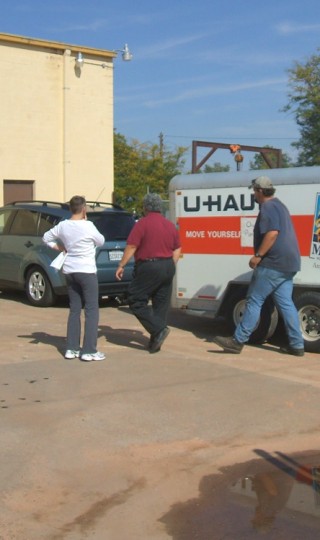Reflections: The Bailout Plan
November 14, 2015
A few weeks ago, I posted a short essay on My Grand Mid-life Crisis Adventure, which ultimately brought me and my daughter, home to live in Massachusetts, although the destination at the time, seven years ago, had been Eastport, Maine. It was the fall of 2008, the economy had tanked and I had been planning our move to Maine weeks before Wall Street had collapsed.
It felt as though there was no choice but to follow through with our move, as my personal economic situation had worsened as did the situation of so many other families living on the edge of poverty. We took to the road with a sense of humor and deep-down inside a sense of great trepidation. This was our bailout plan, to embark on a cross-country journey and move, that would forever be affectionately known as My Grand Mid-life Crisis Adventure.
The story continues…
The Bailout Plan
There were stacks of packing boxes lined up in a 6’ x 12’ space marked off with red tape in the center of the living floor. I put another heavy 12” cubed box of books on one of the stacks and wondered if I should not try to get rid of more of my books. I swiftly tossed that thought out of the open window of my second floor apartment into the 90-degree heat and mused I would not miss that heat. It was the fall of 2008 and we were preparing for our move from Los Angeles to the Down east area of the northern coast of Maine.
The economy had been slowly sinking for the past few years, and as predicted by many who had seen the economic disaster coming, including myself, the bottom was now falling out. The timing was perfect to move from Los Angeles, where the cost of living was quite high, to coastal Maine where the cost of living was considerably lower. At least that was my frame of thought as I prepared for the 3500-mile trek across country with my 19-year-old daughter, Juliet.
We had lived in and out of poverty most of her life, and had spent the past sixteen years living in the same two bedroom second floor apartment in the San Fernando Valley. It was the only home that Juliet really ever knew and now I was taking her away from that home. As her only parent, I was the sole breadwinner in the family and my home business had been faltering since 2003-2004. By the spring of 2008, things were starting to look quite bleak. In fact, my finances had turned quickly from bleak to utterly dire. As much as I wanted out of Los Angeles for emotional reasons, the lure to live somewhere less expensive was on the top of my list of reasons to move back east.
From the time I had first hatched my plan to move to Eastport, Maine during the summer, I saw the need to move increase almost daily. As I sat wearily tallying up the months’ earnings from my business in late August, I had realized I did not have enough to pay the rent for the month of September. It was a bleak moment that coursed the fear of the unknown through my mind and caused me to break out into tears. I was excited one day, petrified the next. It was a huge step and a big risk, moving from one corner of the country to another, polar opposite corner which I had never seen before, save for photographs of the landscape in the area.
What little money I had saved and stashed away was getting us from Los Angeles to Eastport. I could not use my money to move to pay rent, so stuck in an untenable situation, I chose to not pay the rent, knowing full my property owners would start the eviction process despite the fact that they knew we were moving in mid-October. Sure enough, they wasted no time serving me with eviction papers. I came home from the grocery store one afternoon to find the papers attached to my front door.
Despite my pleas and the fact that I was moving all the way across country, they were determined to have their day in court with me, although I told them I would be long gone by the day of the eviction hearing. The court date was set for a day when I would actually be on the road from California to Maine. I would have a judgement on my record, as I would not be able to pay the rent or appear in court to defend myself.
 I did not quite know how it was all going to happen—the move across country; I just knew it needed to happen. The economy was tanking faster than anyone could stop the pain and my business was like many other small businesses going down the tubes. Sink, swim, or bailout. The demise of many a small business was the untold fallout of the economic crash of 2008. So many small business owners had nothing to fall back on. I felt lucky that I had family who had offered me a cheap place to live. My bailout plan was to move to small town coastal Maine where I could rent a two bedroom apartment for $375 a month. It was simple really, whatever fit in the 6’ x 12’ trailer and was an absolute necessity was making the trip. Everything else was either sold on Craig’s List or given away.
I did not quite know how it was all going to happen—the move across country; I just knew it needed to happen. The economy was tanking faster than anyone could stop the pain and my business was like many other small businesses going down the tubes. Sink, swim, or bailout. The demise of many a small business was the untold fallout of the economic crash of 2008. So many small business owners had nothing to fall back on. I felt lucky that I had family who had offered me a cheap place to live. My bailout plan was to move to small town coastal Maine where I could rent a two bedroom apartment for $375 a month. It was simple really, whatever fit in the 6’ x 12’ trailer and was an absolute necessity was making the trip. Everything else was either sold on Craig’s List or given away.
The cross-country move with my daughter was initially was planned as the great escape from the big city that I had never wanted to live in but had made the best of while I did. I wanted out. I wanted nature. I wanted a sense of place that involved the great outdoors, not skyscrapers. The idea that we would soon be living across the street from family also fulfilled a sense of longing that I had carried with me for a very longtime. My daughter had grown up without much family around her. That too would finally change. All in all, the idea of moving to Maine was a multilayered concept meant to fulfill a number of financial and emotional needs. From a new locale to more family in our lives, to a better economic condition that encompassed more affordable housing, the concepts were all there and it felt as though our bailout plan was solid.
We set out from Los Angeles to Maine with a sign on our U-Haul trailer that said, “Our Bailout Plan, Move to Maine.” We had hope, as so many did at the time, that the economy would bounce back quickly. It did not. Many Americans thought the Federal Bailout Plan was a solid plan despite the fact the plan only bailed out Wall Street, not the little people, the struggling poor. Alas, neither bailout went according to plan. The economy sunk deeper into the abyss and like the big banks that had collapsed before our eyes, I watched my small business balance on the precipice of total demise. My bailout, the move to Maine would prove to be good in theory however, bad in principle.
From the less expensive housing costs that proved erroneous, to the lack of work in the area for my daughter, I found we needed further bailing out so as to rise back up from my near financial ruin. I hung on to what felt like a sinking ship, floundering as the waves battered me across the rocky coast of Maine and sent me scrambling to find more support elsewhere. The truth was there was nothing to sustain my daughter and me once we had set down roots in Down east Maine. We were living in a remote, impoverished area where there we no jobs for the locals let alone folks from “away.” After a few months of living in the idyllic and artsy community of Eastport it was clear that the bailout plan needed another nudge.
There were boxes stacked in the living room, kitchen and bedrooms; once again, we were packing up the stuff we dragged across country in the 6’ x 12’ U-Haul trailer. This time we had a 22’ U-Haul truck to accommodate all of that stuff and the stuff we had gotten to replace the stuff we sold in Los Angeles. This time we were headed home to Massachusetts where we had both found jobs and place to live before even moving there. We were full of hope again, seven months later, that the second phase of our bailout plan would work. Like many Americans, we were living on the edge of poverty, scraping by. Now my daughter was old enough to understand what that meant. The prospects, while better in Massachusetts due to finding work were still dim. Until the economy picked back up times would continue to be tough for us and the tens of thousands of other Americans living in poverty during the Great Recession.
Wall Street was saved, but the little people were on their own. Those who lost their jobs, their businesses, their homes, were all migrating in search of better opportunities. Some like us, were driving from point A to point B with signs on their moving trailers and trucks that said “Our Bailout Plan, Move to Maine” or wherever the bad economy would lead them. That was some bailout plan people would say for a long time to come. Yes indeed, Wall Street made out like bandits and the rest of us, well, not all were as lucky as Wall Street.






